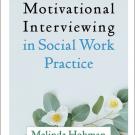
Motivational Interviewing: Creating Change through Hope and Respect
MI is about Change
The January newsletter theme, change, inspired us to contact expert Dr. Melinda Hohman about motivational interviewing (MI). Dr. Hohman’s background as a clinician, educator and author contribute considerable knowledge and insight about making life changes.
During our conversation, she discussed the distinguishing element of change and also added the elements of respect and hope as they relate to both families and providers. We asked Hohman for a definition that we could use with our parent partners, and she quickly shared, “MI is a conversation style where you are partnering with a person to discover their own strengths, motivation and methods for change.” She suggested that if we were talking to judge or court affiliated personnel we could say that, “MI is a well-researched method of communication that has demonstrated success in working with families from diabetes care to criminal justice.”
MI is about Hope
When asked about how MI supports families and providers in the experience of change, Hohman responded unequivocally that MI provides hope. In brief, when MI is implemented with fidelity, it supports families and providers to navigate a set of positive changes in a systematic way. There is acknowledgement of the person’s strengths and behaviors, and there are voiced goals and affirmations for positive change. The goals and, in particular, the affirmations, are an important piece of the overall process that provides hope. According to Hohman, these statements of affirmation as noted by MI’s founders, Bill Miller and Steve Rollnick, are key to calling forth hope that already exists within the client but must be drawn from within to build confidence. Hope is essential to the process of change.
In her work, Hohman learned that seeing clients respond to the MI method gives providers tremendous hope. Providers shared that they felt like some pressure is relieved, removing a feeling there being a problem they have to “fix.” Additionally, providers using MI report a new perspective of seeing clients as more whole people with less focus on problems. MI helps to interact with each individual as a whole person, bringing hope to an entire situation, thereby reducing providers’ own burnout.
The Spirit of MI Includes Respect
The skillful practice of MI that involves all aspects of using the principles of social work, having fidelity to the method and working with clients is called working with the “spirt of MI.” MI includes treating youth and families with dignity, respect and as the experts on their lives—building on their strengths and maximizing their participation in their own change process.
Furthermore, by virtue of the methodology, MI works to honor and respect culture and context where no one is going in as the expert. A number of studies support its cross-cultural use.
For providers, Hohman points out that a positive, respectful support of social work core values adds hope to what can be a strenuous and challenging job. MI training and implementation can also increase skills for positive professional growth and help avoid burnout.
Learning and Practicing
Hohman acknowledges that MI can be a challenge to learn and to implement. This was the primary reason she wrote her book, Motivational Interviewing in Social Work Practice: to provide knowledge and encouragement. The concept of a conversation is deceptively simple but one that incorporates all of the steps and distinctions of the spirit of MI is the true challenge. It can be done but takes good training, some follow-up to course materials and solid practice.
If you are already practicing MI, would you please let us know? Or if you are willing to give it a try, will you let us know? Please consider sending us a reflection email at RCFFPnewsletter@ucdavis.edu and if you are interested, we are happy to keep it confidential or include your ideas in our next newsletter. Your choice!

A big thank you to Dr. Mindy Hohman for taking time to talk with us about MI. Dr. Hohman is enjoying retirement with her grandchildren and continues to write scholarly articles about MI. She is an instructor with UC Davis Human Services (including the Resource Center for Family-Focused Practice) and is the author of Motivational Interviewing in Social Work Practice, 2021, in its second edition.
